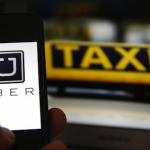E.U. Court's Decision on Uber Will Set Precedent for the Gig Economy

The European Court of Justice will decide whether Uber is a taxi transportation company or a digital platform. A Barcelona judge submitted the request for a decisive clarification for the future of platform capitalism in Europe. On Aug. 7, 2015, the judge referred the decision to the Luxembourg-based courts after a complaint of the Spanish company Elite Taxi against Uber.
The Spanish judge has asked the court "if the intermediation between the owner of a vehicle and the person who needs to travel within a city -- activities that performs for a profit with the management of information technology resources, interfaces and application of computer programs like 'smartphones and technology platforms,' that allow people to get in touch -- should be considered as a mere transportation activity, or an electronic brokerage service or an information technology service."
The judgment won't come until at least March. If the court decides Uber is a transportation service, the multinational corporation, which is worth more than $60 billion, will have to comply with labor and safety laws and comply with the laws that regulate the activities of taxi companies and cooperatives. If, however, the court defines Uber as an "information technology company" or a digital platform that simply matches passenger demand with the supply of self-employed drivers, then the company can continue its "UberPop" service, which allows any driver to go into business as an unlicensed taxi.
Taxi drivers across Europe have risen against UberPop over the past two years. In some cases, they've won, as in Italy, where a Milan court ruling banned the service. The legal panorama is fragmented in Europe. In Spain, Ireland or France, it is believed that Uber should be treated as a transportation company. In the Netherlands -- where Uber's European headquarters is based -- as in Estonia, Iceland, Switzerland, Norway and Luxembourg, the company is defined as a platform that connects the passenger to the driver.
In Luxembourg, it will be decided if the "gig economy," the new capitalist economy of services on demand via smartphones, represents unfair competition against traditional services, since it does not have traditional labor costs.
The battle over the gig economy, which is often waged in defense of incomes, will define the next generation of work and the ability of governments to regulate it. Today those workers are in the shadows, paid through digital tools that have led to protests of bicycle messengers for Foodora in Turin, Italy, and Deliveroo in London and Paris. If the European Court of Justice defines Uber as a 'transportation company, it would enlarge the scope of the first instance judgment adopted by the Labor Court in London, which ordered Uber UK to hire 40,000 drivers.
In England, Uber drivers are not small business owners and do not perform a "gig" in their spare time to supplement their income. They are workers -- employees -- who must be paid the minimum wage, even if they have no protection against unfair dismissal. The pronouncement of Luxembourg on Uber's nature will, in effect, determine whether the British ruling will extend to the European Union.
While awaiting a report by the European Parliament on the "sharing economy," and the E.U. Commission's guidelines, the court's judgment would put in place more compelling rules for corporations like Airbnb and other brands in the gig economy.
The Californian ideology and the total automation dream conceals a secret: Work is not finite. To the contrary, there is always more and more work. But it is so invisible that nobody realizes they're going to have to pay for it.
Roberto Ciccarelli Originally published in Italian on November 30, 2016
